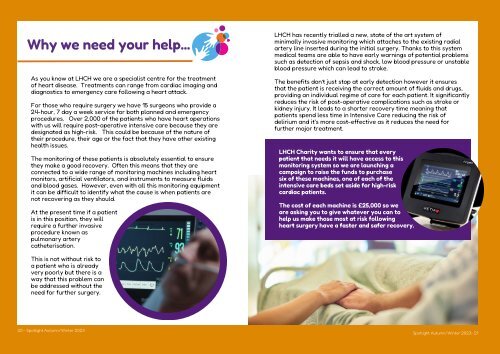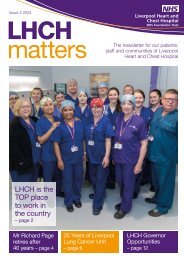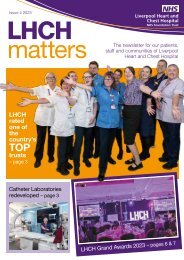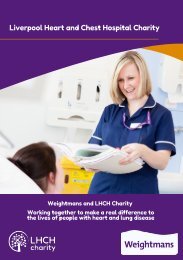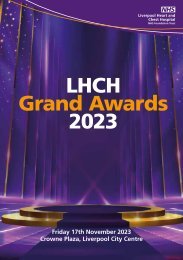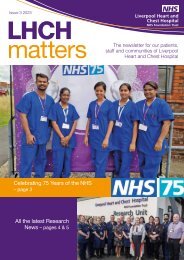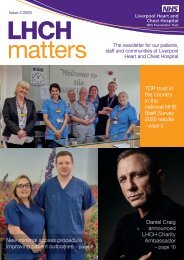Spotlight Autumn/Winter 2023
The newsletter for supports of Liverpool Heart and Chest Hospital Charity
The newsletter for supports of Liverpool Heart and Chest Hospital Charity
You also want an ePaper? Increase the reach of your titles
YUMPU automatically turns print PDFs into web optimized ePapers that Google loves.
Why we need your help...<br />
As you know at LHCH we are a specialist centre for the treatment<br />
of heart disease. Treatments can range from cardiac imaging and<br />
diagnostics to emergency care following a heart attack.<br />
For those who require surgery we have 15 surgeons who provide a<br />
24-hour, 7 day a week service for both planned and emergency<br />
procedures. Over 2,000 of the patients who have heart operations<br />
with us will require post-operative intensive care because they are<br />
designated as high-risk. This could be because of the nature of<br />
their procedure, their age or the fact that they have other existing<br />
health issues.<br />
The monitoring of these patients is absolutely essential to ensure<br />
they make a good recovery. Often this means that they are<br />
connected to a wide range of monitoring machines including heart<br />
monitors, artificial ventilators, and instruments to measure fluids<br />
and blood gases. However, even with all this monitoring equipment<br />
it can be difficult to identify what the cause is when patients are<br />
not recovering as they should.<br />
At the present time if a patient<br />
is in this position, they will<br />
require a further invasive<br />
procedure known as<br />
pulmonary artery<br />
catheterisation.<br />
LHCH has recently trialled a new, state of the art system of<br />
minimally invasive monitoring which attaches to the existing radial<br />
artery line inserted during the initial surgery. Thanks to this system<br />
medical teams are able to have early warnings of potential problems<br />
such as detection of sepsis and shock, low blood pressure or unstable<br />
blood pressure which can lead to stroke.<br />
The benefits don’t just stop at early detection however it ensures<br />
that the patient is receiving the correct amount of fluids and drugs,<br />
providing an individual regime of care for each patient. It significantly<br />
reduces the risk of post-operative complications such as stroke or<br />
kidney injury. It leads to a shorter recovery time meaning that<br />
patients spend less time in Intensive Care reducing the risk of<br />
delirium and it's more cost-effective as it reduces the need for<br />
further major treatment.<br />
LHCH Charity wants to ensure that every<br />
patient that needs it will have access to this<br />
monitoring system so we are launching a<br />
campaign to raise the funds to purchase<br />
six of these machines, one of each of the<br />
intensive care beds set aside for high-risk<br />
cardiac patients.<br />
The cost of each machine is £25,000 so we<br />
are asking you to give whatever you can to<br />
help us make those most at risk following<br />
heart surgery have a faster and safer recovery.<br />
This is not without risk to<br />
a patient who is already<br />
very poorly but there is a<br />
way that this problem can<br />
be addressed without the<br />
need for further surgery.<br />
20 - <strong>Spotlight</strong> <strong>Autumn</strong>/<strong>Winter</strong> <strong>2023</strong><br />
<strong>Spotlight</strong> <strong>Autumn</strong>/<strong>Winter</strong> <strong>2023</strong>- 21


